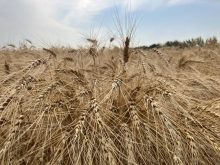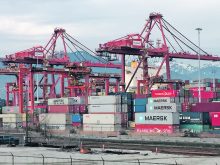A tenuous agreement allowing some of Ukraine’s Black Sea ports to start shipping grain could be a lifeline for the country’s farmers.
The war caused shipping costs to soar to US$160 to $180 per tonne from pre-war levels of $35 to $40 per tonne, said Mykola Gorbachov, president of the Ukrainian Grain Association.
Farmers are getting $280 to $290 per tonne for their barley, leaving a slim return of around $100 per tonne after paying transportation costs.
Read Also

Canadian Food Inspection Agency extends chronic wasting disease control program consultation deadline
Date extended for consultation period of changes to CWD program
That return is eaten up by the average cost of production at $200 per tonne, resulting in a net loss of about $100 per tonne.
It’s the same scenario with wheat, Gorbachov said during a July 19 webinar hosted by the Agricultural Market Information System (AMIS).
He expects farmers to abandon wheat and barley in favour of sunflower and rapeseed crops in 2023 because oilseeds are far more profitable to grow under current circumstances.
The webinar occurred a few days before Russia, Ukraine, Turkey and the United Nations signed a deal allowing up to five million tonnes of Ukrainian grains and oilseeds to leave the country’s Black Sea ports each month.
The deal is valid for 120 days and is expected to be renewed unless the war has ended by then, according to Reuters.
But it is a tenuous arrangement. Ukraine reported that one day after the signing of the pact, Russia fired a missile hitting the Port of Odessa.
Gorbachov said it is imperative that grain begins to flow because Ukrainian farmers are in desperate shape.
“I think more than 50 percent of farmers will become bankrupt in the next few months,” he said.
Growers have used up all their cash reserves. Commercial banks won’t give them lines of credit and neither will crop input providers. They must rely on loans from state-owned banks.
In addition to their financial woes, farmers are having to navigate fields littered with unexploded incendiary devices and craters caused by bombs and missiles.
There are also crop input shortages. Ukraine’s agriculture ministry is attempting to import 1.5 million tonnes of fertilizer from the European Union for next year’s crop.
But Gorbachov said those efforts are likely futile because there will be no demand for the product.
“Farmers are nearly bankrupt and they will not use fertilizer anymore,” he said.
Production of grains and oilseeds in 2022 is forecast at 69 million tonnes, down from 106 million tonnes in 2021.
Exports are forecast at 31.5 million tonnes, down from 54.2 million tonnes.
The association is forecasting 10 million tonnes of corn exports, 10 million tonnes of wheat and two million tonnes of barley exports.
But that was prior to the announcement of the new Black Sea port agreement, which will greatly boost those estimates if the deal remains intact.
The country has gone from shipping an average of six million tonnes of grains and oilseeds per month to 2.2 million tonnes in June, which was a post-war monthly record.
An agreement allowing for five million tonnes of Black Sea grain exports would be huge and would reduce shipping costs five-fold, said Gorbachov.
It would also help with a looming grain storage problem.
He is forecasting that half of the country’s corn crop will not be harvested due to storage constraints and a natural gas shortage that is expected to make drying costs uneconomical.
One solution for the storage issue is silo bags but the factory that makes them in Kiev has been destroyed, so farmers have to import bags and they are proving hard to find.
Gorbachov expects farmers will only grow what they can sell domestically and for export in 2023. They will not produce any excess grain for storage because it is too risky under current circumstances.
He loaded rail cars with corn in April and they have yet to cross the Romanian border. There are serious concerns about deteriorating quality for some crops due to the logistical quagmire.
Contact sean.pratt@producer.com
















